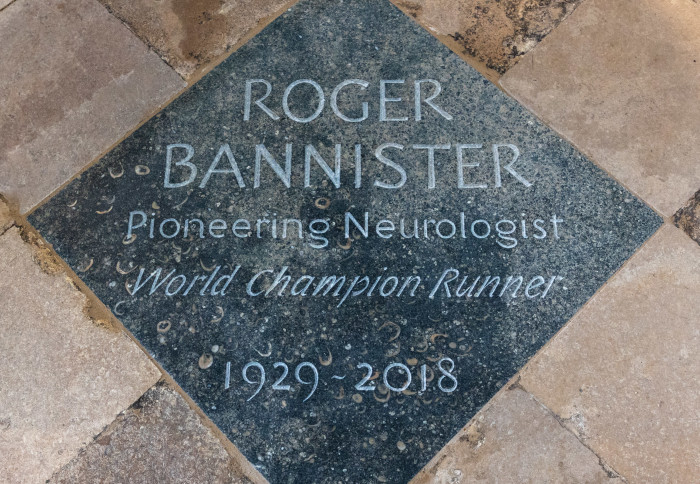Imperial alumnus Sir Roger Bannister honoured at Westminster Abbey
by Joy Adeogun

A new plaque dedicated to Sir Roger Bannister has been unveiled in Westminster Abbey commemorating his contributions to neurology.
The late Sir Roger Bannister (1929 – 2018) was an esteemed neurologist and runner of the first sub-four-minute mile. He studied medicine at the University of Oxford before attending St Mary’s Medical School, which has now become part of Imperial College London.
He was associated with St Mary’s for over 50 years and with numerous other medical institutions now linked to Imperial. As a result of his contributions to medicine, a lecture theatre at the campus named in his honour was opened in 2004.
Marked in history
Now in September 2021, a new plaque has been unveiled in Westminster Abbey highlighting Sir Roger’s contributions to science. He always held the notion that his achievements as a neurologist were more significant than his achievements as a track-runner and therefore the memorial ledger stone will be dedicated in Scientists’ Corner in the nave of the Abbey. It will be close to the graves of distinguished fellow scientists Sir Isaac Newton, Charles Darwin, and Professor Stephen Hawking.

Clive Bannister, his son, said: “It is very moving for everyone in our family that my father should be given a permanent memorial in this sacred place. As details of his medical and athletic career fade, one is drawn to consider what may remain as people decades, or centuries, from now walk through the Abbey and come upon this stone.
“My father served as a physician, teacher and researcher; in this last role seeking to find the causes and treatments of illnesses in his field and extend general scientific understanding of the human mind and body. […] “My hope is that when individuals view this memorial in future, they will draw inspiration from it in their own lives by reflecting on the essence of his: the full use of his gifts for the betterment of others.”
One of sport’s greatest heroes
Sir Roger is also known for being one of the most famous medical students in the world, as he was the first man to run a mile in under four minutes.
At an event celebrating his life, Steve Cram, Chancellor of the University of Sunderland and former Olympic silver medallist, spoke about Sir Roger’s sporting achievements: "It's very rare that your sporting career can be summed up in the space of four minutes. There have only been 13 of us since then who have had the privilege to break the world record. He captured the pioneering spirit of the times and what he did was magnified around the world. Sport needs its heroes. Sir Roger Bannister was one of its greatest.”
It’s very rare that your sporting career can be summed up in the space of four minutes ... Sport need its heroes. Sir Roger Bannister was one of its greatest. Steve Cram Chancellor of the University of Sunderland and former Olympic silver medalllist
He received a knighthood in 1975 and later revealed his diagnosis of Parkinson’s Disease in 2014. Four years later, he died 20 days before his 89th birthday.
Professor Jonathan Weber, Dean of Imperial’s Faculty of Medicine, speaking in memory of Sir Roger said: "As a faculty, we mourn this towering figure of 20th century sport and medicine and celebrate his lifetime of commitment to St Mary’s."
Ground-breaking achievements
During his career as a neurologist, Sir Roger specialised in understanding and treating disorders of the autonomic nervous system, which controls all the automatic functions of the body — such as heartbeat, blood pressure, and digestion. His work in general neurology and specialty in autonomic nervous system disease led to his widely admired textbook on this topic, co-authored with Professor Chris Matthias, which is now in its fourth edition.
Alternatively, during his career on track when aged 23, Sir Roger came fourth in the 1500-metre final of the 1952 Olympic Games in Helsinki. Whilst studying at Oxford, he ran the mile in 3 minutes 59.4 seconds, breaking the previous world record, which had stood for almost nine years. Finally, the same year before retiring from competitive athletics he also won the mile at the Commonwealth Games and the 1500-metre final at the European Games.
The Dean of Westminster, the Very Reverend Dr David Hoyle, said: “Throughout his life Sir Roger Bannister reached out for that which lay beyond. As a sportsman, pushing himself towards a prize some considered beyond human reach, as a scientist ever eager for deeper understanding of neurology. We are delighted that his memory and his achievement will be set in stone in the Abbey. He ran the race set before us all.”
Westminster Abbey images credit: Andrew Dunsmore/Westminster Abbey
Article text (excluding photos or graphics) © Imperial College London.
Photos and graphics subject to third party copyright used with permission or © Imperial College London.
Reporter
Joy Adeogun
Communications Division